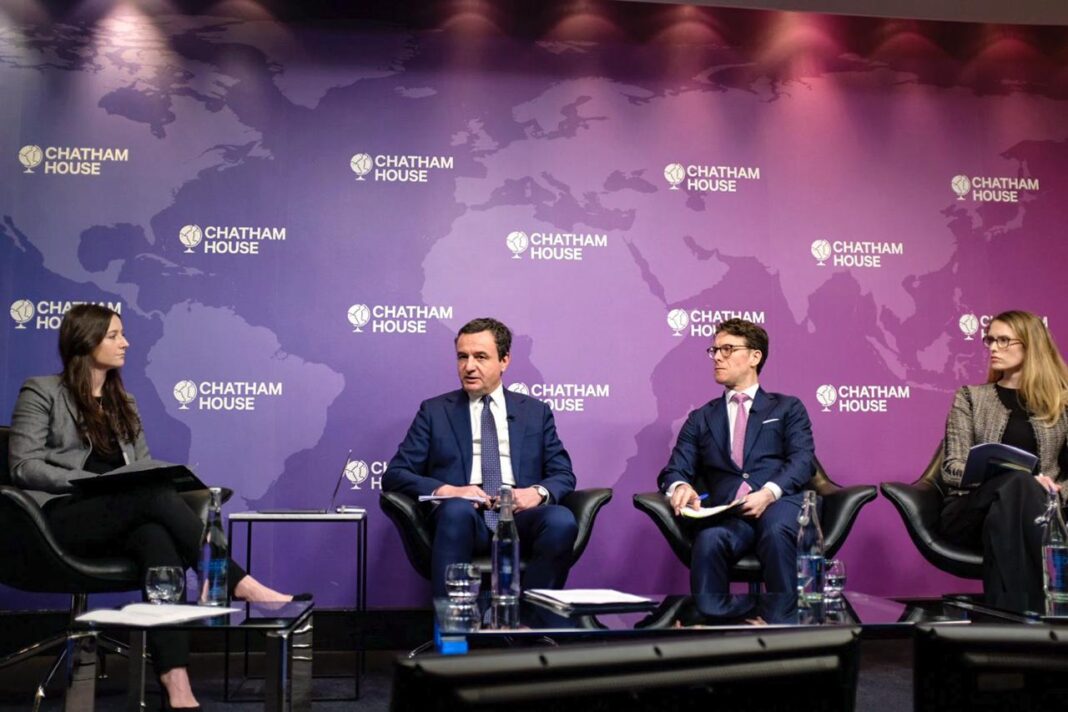Prishtinë, 13 shkurt 2024
Dje në Londër të Mbretërisë së Bashkuar, Kryeministri i Republikës së Kosovës, Albin Kurti mori pjesë në panelin e diskutimit të organizuar nga instituti ‘’Chatham House’’ në të cilin ishte njëri nga folësit kyçë. Temë e diskutimit ishin sfidat e sigurisë me të cilat ballafaqohet rajoni, përkatësisht Ballkani Perëndimor.
Në fjalën e tij hyrëse, ai fillimisht foli për progresin, arritjet dhe politikat e qeverisjes së deritanishme, dhe rezultatin e tyre në rritjen e mirëqenies të qytetarëve dhe lehtësimin e integrimit të komunitetit serb në Kosovë. Ai veçoi faktin që liberalizimi i vizave që hyri në fuqi me 1 janar të këtij viti ka rritur interesimin e serbëve të Kosovë për t’u pajisur me pasaporta të Kosovës, si dhe konvertimin e suksesshëm në targa të Kosovës për vetura nga ato ilegale të Serbisë në mesin e pronarëve nga radhët e komunitetit serb në Kosovë.
Për sa i përket rreziqeve dhe sfidave të sigurisë, kryeministri Kurti theksoi se aleanca e fortë e Serbisë me Rusinë nuk është vetëm rrezik teorik për Evropën dhe Ballkanin Perëndimor, por është rrezik real, me të cilin Kosova, por jo vetëm, përballet rregullisht. Ai shtoi se prezenca e Rusisë në Ballkan po rritet nëpërmjet Serbisë, dhe se në këtë kontekst një marrëveshje e nënshkruar ndërmjet Kosovës dhe Serbisë është më urgjente se kurrë. Mos nënshkrimin e deritanishëm të marrëveshjes, kryeministri e cilësoi si shenjë të qartë të mungesës së mirëbesimit, i cili është i nevojshëm për të pasur siguri ligjore dhe zbatim të asaj për çka palët janë pajtuar. Për më tepër, kryeministri theksoi se refuzimi për të nënshkruar marrëveshjen nënkupton gjithashtu se Serbia dëshiron ta lë të hapur opsion e invazionit në Kosovë.
“Siguria e Kosovës dhe mbështetja për të është baza mbi të cilën vendi ynë mund të vazhdojë të rritet”, nënvizoi kryeministri Kurti, teksa tha se Serbia, apo cilido aleat potencial i Rusisë, nuk mund ta mbajë rajonin larg BE-së sepse kjo do t’i shërbente vetëm Rusisë dhe përpjekjeve të saj për ta ndarë përsëri kontinentin. Andaj ai tha se nga BE-ja duhet një qasje e cila nxitë përafrimin e vendeve të rajonit në Bashkimin Evropian mbi baza meritore, në vend se i gjithë rajoni të mbetet peng i një vendi të vetëm. “Serbia me regjimin e saj autoritar po e mban të gjithë rajonin prapa”, tha ai.
Diskutimi i cili zgjati rreth një orë u moderua nga redaktorja e gazetës “The Telegraph”, Danielle Sheridan. Panelistë tjerë, përkrah Kryeministrit ishin Andin Hoxhaj, ligjërues në Kolegjin Universitar të Londrës (University College of London) dhe Armida van Rij, hulumtuese e lartë në institutin ‘’Chatham House’’.
Fjala hyrëse në gjuhën angleze e Kryeministrit Kurti:
It gives me great pleasure to be here today with all of you and to have the opportunity to share with you some of my thoughts on a very timely and significant topic. Moreover, it is an honor to be here at the Chatham House, a think tank with a tradition of over 100 years. Being part of a new country has its many benefits because the newness is inspiring and gives you the freedom to create. I believe that our government that came out of a big election victory three years ago is an expression of that. But at the same time, being part of such a storied tradition gives you a sense of perspective that issues are greater than individuals.
Nowadays, we are in an ideological battlefield with very concrete consequences. Some might argue about its division and how it is exactly split, but we cannot deny that on one side, there is an authoritarian threat. This side is working by manipulating people’s fears to gain and keep more power.
The Western Balkans is seeing this dynamic play out very actively and vividly. There is a tendency to treat the Western Balkans like a monolith, as if it is a homogeneous region in terms of governments and people, but to understand the dynamics, I believe that we have to understand the differences. So the Western Balkan countries, although they share a lot of similarities, – social, cultural and historical – are on their individual paths. And this depends mainly from their governments.
You have democratic progress in Kosova, combined with economic growth and institutional stability. In contrast, in Serbia, our norther neighbour, under the rule of an authoritarian leader you have a complete captured state.
In the last three years, our economy has grown in a steadfast manner, with an average growth of 6.2% of GDP. We have doubled both, Foreign Direct Investments and exports, and tax revenues increased by 2/3 without changing fiscal policies, because when people see there is no corruption in the government they are more ready to contribute and pay taxes. And when they are hopeful, they are optimistic about the future, they rather spend then save which is good for their lives and our economy.
Then we’ve introduced social policies that didn’t exist in our country before. We’ve made public education free at both the undergraduate and graduate levels. We’ve introduced universal benefits for all children. We’ve tackled youth unemployment with a new government platform. Strengthened aid to minorities, and for the first time, the office of the Prime Minister issues all communication in Serbian language as well. This progress has been recognized internationally by different prestigious organizations. In 2023 Freedom House report ranked Kosova 1st in the Western Balkans, 2nd in Europe, and 3rd in the world for advancements in political rights and civil liberties. We improved by 22 places in just two years in the Reporters Without Borders’s World Press Freedom Index, and jumped 21 places in the Transparency International’s Corruption Index since our government took office.
The accountability of the government and a drive for social welfare have made integration of the Serbian community feasible. For example, the issue of license plates, which was a very burning issue. It looked very technical but was not really, because technical things get easily politicized. Over 4000 license plates from the Serbian community were registered to Republic of Kosova plates. In preparation for the Schengen visa liberalization which came into effect January 1st this year, we also saw a rise in applications for Kosova passports – for example, over 5800 in the four northern municipalities.
So there has to be an adjusted approach to foster an incremental and merit-based closeness to the European Union. I do not that think it can be or should be all or nothing. And one country cannot hold everyone back. In my view, Serbia with its authoritarian regime is holding the entire region back. Serbia recognizes de jure Bosnia and Hercegovina but not de facto, likewise Montenegro. In the case of Kosova opposite is rather true. They recognize us at large extent de facto, but no de jure. There is general thesis that Serbia is keeping good relations with Russian Federation and China, in order to use that in its aggressiveness towards Kosova. But I would claim the opposite is not just more interesting but more useful to understand the current state of affairs. Namely, Serbia uses, utilizes its aggressiveness towards Kosova in order to keep good relations with Russian Federation and China. Because towards dictators who trust no one, you have to prove yourself time and again. And I think this is what president Vucic is doing. With his aggressiveness towards Kosova he is trying to keep good relations with Kremlin.
Therefore, there is no wonder that Serbia’s backsliding, or the backsliding of any country for that matter, is not only about them joining the EU. It’s about what is happening at home. It’s also about the security of neighbouring countries too. The relations that you have with neighbours, tells a lot about yourself.
We have a 381 km long border with Serbia. The border that we have with Montenegro, Albania and North Macedonia combined, is shorter than the one that we have with Serbia. That border was invaded by paramilitary troops last September. Serbian paramilitary troops opened fire on our police and killed a police sergeant, Afrim Bunjaku. The military build-up around our border was called “unprecedented” by the US senior officials. It took National Security Advisor of White House, Mr. Jake Sullivan to say to Serbia to back off so all these 48 forward operating bases that they have around Kosova and where they brought modern technology that they got from China, namely systems FK3, to withdraw a bit a partially.
I want to emphasize that the threats, or the storm as we say here in this discussion, do not come from people, but from above. Democracy comes from below, but threats do not come from below. Threats come from above. It is these not democratic, autocratic leaders who employ structures like Wagner-wanna-be that threaten the stability, security and peace.
We have seized over 5-million-euro worth in arms and military-grade equipment. Three times altogether last year, on 23rd of June, 5th of September and 24th of September. Last May two organizations marked as terrorist ones by Kosova – the Northern Brigade and Civil Protection – injured around 90 NATO soldiers, some had to get amputations. A country that has witnessed genocide in living memory cannot be subjected to these kinds of threats to violence and violence.
So Serbia’s strong allyship to Russia is not a theoretical threat for Europe and Balkans, which is part of Europe and should become part of the EU. It is a real threat and one that Kosova, but not only, experiences regularly. And through Serbia, we have seen a build-up of Russian presence in the Balkans, whether through media, intelligence, or other forms of interference.
In light of this, a signed agreement between Kosova and Serbia is more urgent than ever. Not signing of the agreement that we have is a clear sign of bad faith. So we need bona fide in order to have legal certainty and implementation of what we have agreed upon so far. And that also means when they reject to sign the agreement, that they want to keep an option open to invade Kosova. So, I cannot see any other substantial meaning to refusal to sign other then they want to keep this door open that there will be some window of opportunity to come back and do the aggression again. And no wonder that president Vucic refer to father and son leaders of Azerbaijan, Aliyev saying that they were smart because they consider that they have to wait for historical window of opportunity which showed up itself 27 years later. So, I wonder now, whether he meant 27 years from 1999 which would mean 2026 or 27 years from last year which would relax us a bit because then it is 2050.
The security of Kosova, and support for it, is the bedrock on which our country can continue to grow. And of course, Serbia, or any potential ally of Russia, cannot hold the region back from the EU because it would simply serve Russia in their attempt to divide the continent again. So now it is the time for the EU to very carefully and deliberately reward democratic reform. Because that is the only way it will enforce it in the region.
It is true that these 4 mayors in the North, 4 Albanian majors, have hollow legitimacy out of low turnout, but others have no legitimacy whatsoever. So now we are on a legal path to have early elections and I look forward as soon as possible to have these early elections, so 4 Serbian mayors will be in the North. But violent mobs, terrorist structures cannot get into office thanking their violence and destabilization attempts. You must have a due democratic legal process, and as Prime Minister, I am there to help them to have early elections and elect new mayors there.
So yes, I acknowledge that legitimacy is slim, but others who want to replace current mayors must have legality, legitimacy, and take office only after new elections.
***
Premijer Kurti je učestvovao na panel diskusiji koju je organizovao Institut Chatham House
Premijer Republike Kosovo, Albin Kurti učestvovao je juče u Londonu, Ujedinjeno Kraljevstvo, na panelu za diskusiju u organizaciji Chatham House Instituta, na kojem je bio jedan od ključnih govornika. Teme diskusije bili su bezbednosni izazovi sa kojima se suočava region, odnosno Zapadni Balkan.
On je u svom uvodnom izlaganju prvenstveno govorio o dosadašnjem napretku, dostignućima i politici vlade i njihovom rezultatu u povećanju blagostanja građana i olakšavanju integracije srpske zajednice na Kosovu. On je istakao da je liberalizacija viza koja je stupila na snagu 1. januara ove godine povećala interesovanje kosovskih Srba za dobijanje kosovskih pasoša, kao i uspešnu konverziju na kosovske registarske tablice za automobile sa srpskih ilegalnih, među vlasnicima iz redova srpske zajednice na Kosovu.
Kada je reč o bezbednosnim rizicima i izazovima, premijer Kurti je istakao da čvrst savez Srbije sa Rusijom nije samo teoretski rizik za Evropu i Zapadni Balkan, već je realan rizik sa kojim se Kosovo, ali ne samo, redovno suočava. On je dodao da prisustvo Rusije na Balkanu raste kroz Srbiju i da je u tom kontekstu jedan potpisani sporazum između Kosova i Srbije hitniji nego ikada. Nepotpisivanje dosadašnjeg sporazuma premijer je ocenio kao jasan znak nedostatka dobrog poverenja, koji je neophodan za pravnu sigurnost i sprovođenje onoga za što su se strane dogovorile. Štaviše, premijer je naglasio da odbijanje potpisivanja sporazuma znači i da Srbija želi da ostavi otvorenu opciju invazije na Kosovo.
„Bezbednost Kosova i podrška njoj je osnova na kojoj naša zemlja može da nastavi da raste“, podvukao je premijer Kurti, rekavši da Srbija, ili bilo koji potencijalni saveznik Rusije, ne može da drži region daleko od EU jer bi to služilo samo Rusiji i njenim naporima da ponovo podeli kontinent. Zbog toga je, kako je rekao, potreban pristup EU koji promoviše konvergenciju zemalja regiona u Evropsku Uniju na meritornoj osnovi, umesto da ceo region ostane talac jedne zemlje. Srbija sa svojim autoritarnim režimom koči ceo region“, rekao je on.
Diskusiju, koja je trajala oko sat vremena, moderirala je urednica lista “The Telegraph” Danielle Sheridan. Ostali panelisti, pored premijera, bili su Andin Hoxhaj, predavač na Univerzitetskom Koledžu u Londonu (University College of London) i Armida van Rij, viša istraživačica na Institutu Chatham House.



